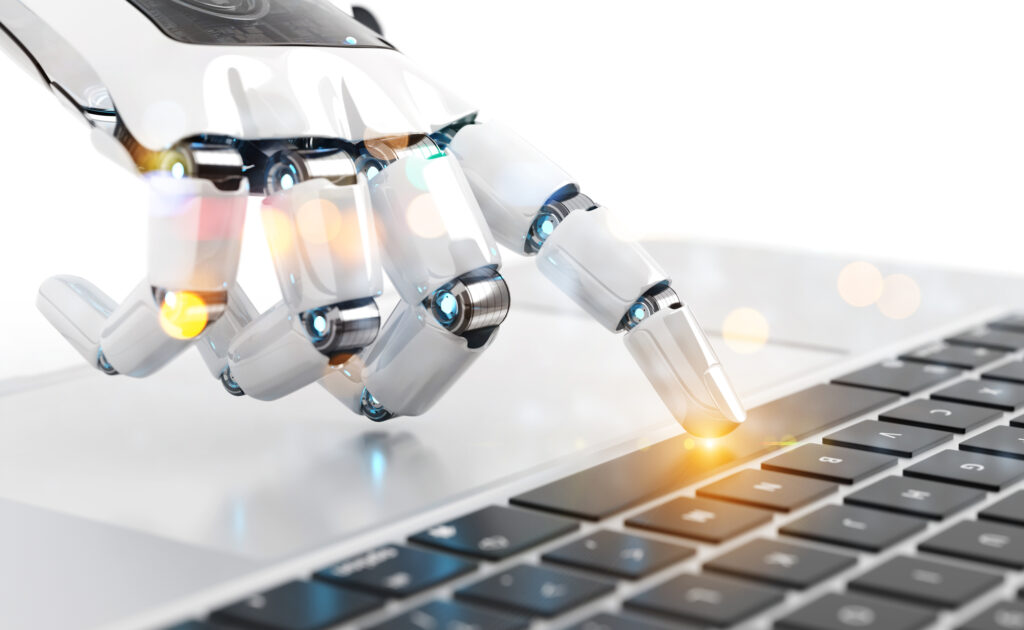More and more people wonder, “Is it safe to do my job?” as AI becomes smarter.
The name of the website speaks for itself. You can search for a specific job title to see if it’s likely to be replaced by AI.
We were delighted to discover that marketing managers have a 1.4% chance of being replaced or automated by robots and artificial intelligence. Although I was relieved to learn that the likelihood of writing being automated is only 3.8%, this made me consider other job roles.
But those who are more likely to lose their jobs due to AI should not panic yet.
It’s likely not 100 percent accurate, just like AI predictions. This is because job titles aren’t always universal. Some writers may write adventure novels while others will create news articles or blog posts. While one marketing manager may manage social media, another might manage the content.
We recommend that you seek professional advice for your career choices in the future, even though this website is a lot of fun to browse. You won’t panic when AI can help you, rather than harm your career. If you are one of those few in danger, then experts can help you to determine which skills you need to future-proof your job.
We’ve created lists of jobs AI cannot replace, based on the advice of experts, statistics from the website mentioned above, and research.
Before we dive into this list, let’s first examine the current state.

Artificial Intelligence Disruption has Already Begun
Think again if you believe that AI will only disrupt jobs on the assembly line. AI can also be more effective than humans in certain aspects of marketing and sales.
AI can analyze sales calls faster than any human sales manager. It would require nine continuous years of sales call analysis before a person could compete. It’s already being used by marketers to create their content strategies and for email marketing playbooks.
HubSpot’s co-founder and chief technology officer Dharmesh Shah is more optimistic about the future of AI. He believes that bots and AI can make us more efficient at our jobs, and better in our careers.
In many cases, AI can make our work easier and make us more data-driven and effective. Machines will inevitably replace some jobs. This is the core of any technological or industrial revolution. Some jobs will not be replaced, but they may be adjusted to accommodate the “careers” of new technologies.
In light of the landmark 2013 study, which inspired “Will robots take my job?,” we’ve identified some of the roles in marketing and sales that are most likely to be taken over by bots and AI within the next few decades.
This study analyses the likelihood that a particular job will be automated and computerized. It is based on the amount of routine in a given job, the level and type of training required, and the social intelligence needed to do the job. This is not an exhaustive list but gives you a good idea of how your life might look in the future.

Artificial Intelligence Can Replace 10 Jobs
- Telemarketing
- Bookkeeping Clerks
- Compensation and Benefits Managers
- Receptionists
- Couriers
- Proofreaders
- Computer Support Specialists
- Market Research Analysts
- Advertising Salespeople
- Retail Salespeople
1. Telemarketers
Score: 99%
Why? You likely already receive robocalls for various products and services. Career growth in telemarketing is expected to decrease by 3% by 2024. It’s partly because telemarketers aren’t required to have a high degree of emotional intelligence or social intelligence. Are you likely to buy from a telemarketer if they approached you? The conversion rates of direct telephone sales are usually below 10%. This makes this role an ideal candidate for automation.
2. Bookkeeping Clerks
Likelihood: 98%
Why? Job opportunities in this field are expected to decrease by 8% between 2024 and 2024. It’s not surprising that most bookkeeping has been automated. QuickBooks, FreshBooks and Microsoft Office offer software to do your bookkeeping, which is much cheaper than an individual’s salary. It’s not surprising that this job is so likely.
3. Compensation and Benefits Managers
Likelihood: 96%
Why? This one is surprising because job growth was supposed to be 7.5% by 2024. Just because demand is high doesn’t mean you’re safe from automation. As businesses grow, especially in multinational markets, a paper-based and human system can cause more delays and costs. Automated benefit systems save time and energy when providing benefits to a large number of employees. Companies like Ultipro, Workday, and others are already widely used.
4. Receptionists
Likelihood: 96%
Why? Pam foretold this on The Office. But if you don’t like it, automated scheduling and phone systems can replace the traditional role of a receptionist — especially in modern technology companies without office-wide telephone systems or multinational corporations.
5. Couriers
Likelihood: 94%
Why? Couriers, delivery people, and other workers are being replaced by drones or robots. It’s just a matter of time before this area is completely automated. This space is also expected to grow by 5% by the year 2024. So it may not happen as fast as you think.
6. Proofreaders
Likelihood: 84%
Why? Proofreading is everywhere, and HubSpot uses it often. Many technologies allow you to check your writing. From Microsoft Words’ simple spelling and grammar checks to the Hemingway app and Grammarly, there is a wide range of technology available.
7. Computer Support Specialists
Likelihood: 65%
Why? The field is expected to increase 12% by 2024. But with so many instructions, step-by-step guides, and other hacks on the Internet, it’s not surprising that companies will increasingly rely on automation and bots to answer questions from customers and employees in the future.
8. Market Research Analysts
Likelihood: 61%
Why? Market research analysts are crucial to the development of messages, content, and products. But automated AI and surveys can help compile information much more quickly. GrowthBot can, for instance, conduct market research by using a Slack command.
9. Advertising Salespeople
Likelihood: 54%
Why? As advertising moves away from print and television, and towards web-based and social media platforms, marketers don’t have to manage sales. social networking platforms make it easier for people to purchase space via free APIs and self-service ad marketplaces. This removes the salesperson and makes it quicker and easier for users to make money.
10. Retail Salespeople
Likelihood: 92%
Why? If you have visited a mall or car dealership recently, it’s possible that you were not assisted at all by a salesperson. Self-checkouts and other features are helping to democratize the shopping experience. Modern buyers also have a greater understanding of the internet and are more likely than ever before to research their purchases and make a purchase on their own.
Ten Jobs that AI Can’t Replace
- Human Resource Managers
- Sales Managers
- Marketing Managers
- Public Relations Managers
- Chief Executives
- Event Planners
- Writers
- Software Developers
- Editors
- Graphic Designers

1. Human Resource Managers
Likelihood: 0.55%
Why not: It is in the title, but the Human Resources department of your company will probably always require a person to handle interpersonal conflict using non-cognitive skills and reasoning. As companies grow, they will need more vital structures to support and help employees.
2. Sales Managers
Likelihood: 1.3%
Why not: Sales Managers need to have a high degree of emotional intelligence to meet their monthly quotas, collaborate and network with customers and motivate the sales team. The managers must also analyze data, interpret trends and adapt to changing situations.
3. Marketing Managers
Likelihood: 1.4%
Why not: Marketing Managers have to interpret data and monitor trends. They also oversee campaigns and create content. The marketing manager must also be able to adapt quickly to new situations and feedback from customers and the rest of the organization.
4. Public Relations Managers
Likelihood: 1.5%
Why not: Successful PR managers depend on a network to secure press placements for their companies, which makes this a completely safe role. To raise money or encourage people to take part in a campaign or issue, PR managers need to have a human touch.
5. Chief Executives
Likelihood: 1.5%
Why not: It is nearly impossible to automate the art of leadership. After all, it can be difficult to teach. Chief executives must inform broad strategy and represent the missions and objectives of their companies, as well as motivate large teams working for them. Companies answer to boards of directors and stakeholders, but they wouldn’t like a robot to give them a report on earnings.
6. Event Planners
Likelihood: 3.7%
Why not: Event Planning is a Growing Field. If you ask our HubSpot events team, planning an event, whether it’s for employees or customers, or an Industry Event involving tens of thousands of attendees, has many moving parts. Planners must coordinate and negotiate with contractors, freelancers, and vendors to bring things together. The organizational and people skills required will make it near impossible to automate.
7. Writers
Likelihood: 3.8%
Why not: (I exhaled a sigh with relief when I saw this). The writers must create and produce their original material. While AIs are capable of generating some content, such as title suggestions, social media messages, and writing prompts, blog posts, plays, books and movies will still be created by humans shortly.
8. Software Developers
Likelihood: 4.2%
Why not: Software development and engineering is a difficult tasks for humans. The time and skills required to develop applications, software, and websites are hard to duplicate, especially because developers must execute flawlessly to produce great products for their customers. Software developers are expected to see a growth of 19% in 2024.
9. Editors
Likelihood: 5.5%
Why not: While the automated proofreading technologies mentioned above can relieve editors of some work, editors still have to check the writers’ submissions for accuracy, completeness, and uniqueness. Some programs can check for clarity or scan for plagiarism. However, editors must read the work in a similar way to another person.
10. Graphic Designers
Likelihood: 8.2%
Why not: While there are AIs that have taken small (and rather creepy ) steps into the graphic design world, graphic design requires both technical and artistic skills, which makes it a perfect role for humans to perform. Graphic design is no different. Just as all writing must be unique and tailored to the client, graphic design also requires a human designer and editor.

Navigating Artificial Intelligence
We spoke to two experts about the current state of AI, and how it might impact future job landscapes: Mike Lieberman, CEO and Chief Sales Scientists at Square 2, and Kate O’Neill, author of Tech Humanist, and Founder of KO Insights.
Lieberman says that marketers and sales leaders currently apply AI to generic high-level situations, such as personalization and the selection of content they present to prospects. Smarter email marketing is another great example. For instance, knowing when people are opening emails and sending them at that time.
He says, “The best thing about this application is that it produces better results – which should be the goal for smarter AI-powered marketing.”
Lieberman said that it is highly likely that AI would supplement the advice, guidance, and recommendations of marketing agencies.
He explains: “For example, consultants today help companies to know what to, when to, and how to, but soon AI-powered insight and recommendation software will give marketing their to-do lists and this list is prioritized according to their specific goals.” This application will help them improve their program performance every day.
O’Neill explains that jobs that require emotional intelligence cannot be replaced by AI. These jobs will remain safe shortly.
She says that “This is a constantly moving target.” For the moment, AI cannot use emotional intelligence or understand the context of a situation, make judgment calls, or see nuance, meaning, and other subtleties like humans.
“Any job that can benefit from these human qualities is better done by humans,” she said. “A computer or robot can help you perform efficiently, but you are the one that adds expertise in how to perform properly,” she said.
She explains, however, that this may change over time.
“Machines are becoming more sophisticated. They will be able to distinguish between happy and sad events for people or interact with children or adults or even what tone of voice to use when sending a message. These are only a few examples.
She emphasizes that AI, while it may drastically change some jobs shortly or far future, will enable humans to spend their time more on tasks they enjoy rather than those which are time-consuming.
What’s exciting is that we are at a point of development where we can help machines offer contextually appropriate interaction while creating more meaningful work for people.
How to Future-Proof Your Career
Although AI can replace smaller and more time-consuming tasks, it cannot easily replace the emotions and behaviors of humans that audiences and customers identify with. Some customers still prefer to speak to a human customer service representative over a bot when they are having a problem.
A company may also need to hire a manager or chief executive with high emotional intelligence, or who has other teamwork skills.
AI may not be able to replace employees who are creative and can go outside of the box.
To avoid being replaced by robots, you should identify the skills and qualities that are irreplaceable. Focus on these and try to improve them as much as possible.
If your job involves a lot of tasks that a robot could do, you may want to take on a project which will teach you management or leadership.
You could take a course in a creative skill like graphic design, public speaking, or writing if your company offers professional growth. If your position changes, you may be able to easily switch to another one or appear more valuable to an employer due to the unique combination of your logistical and creative abilities.